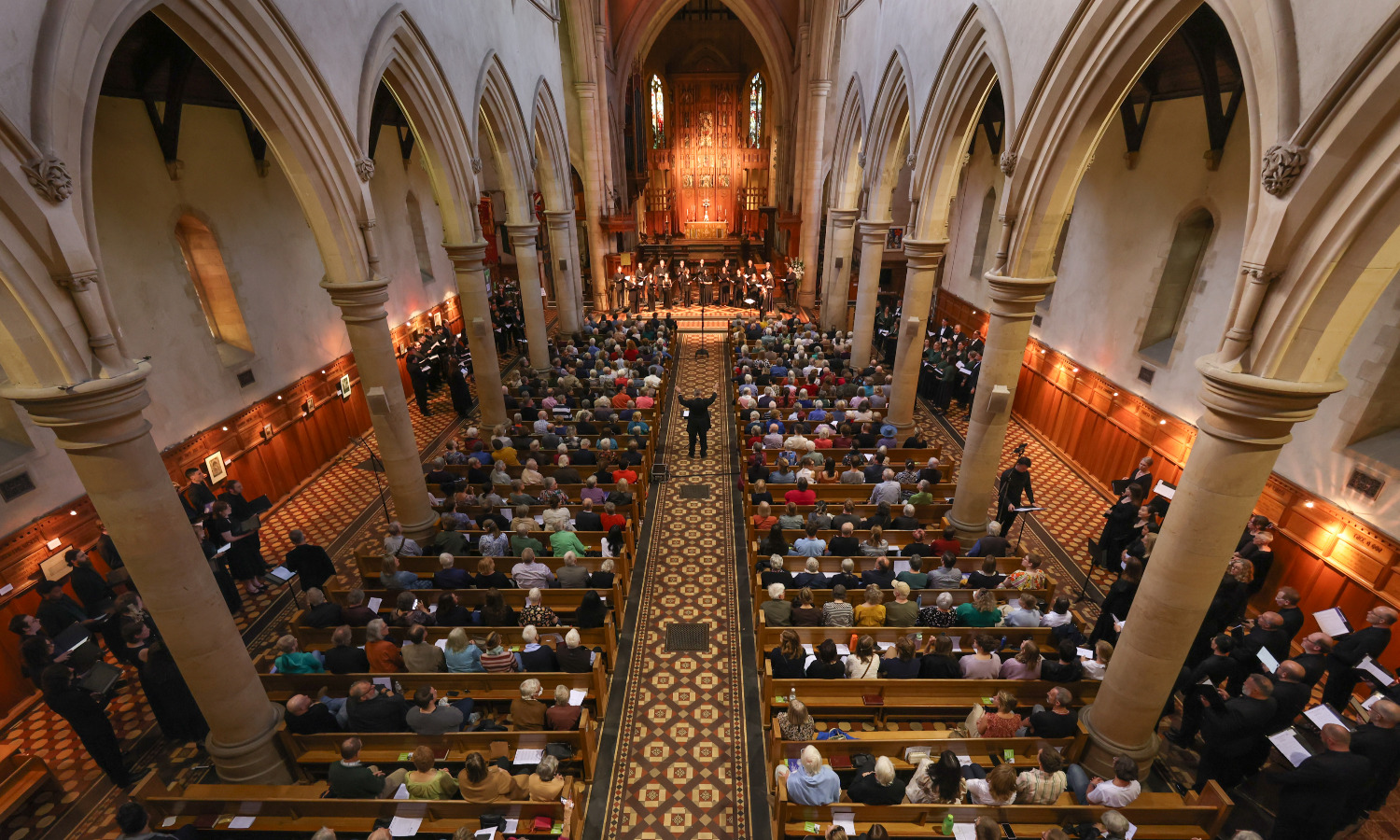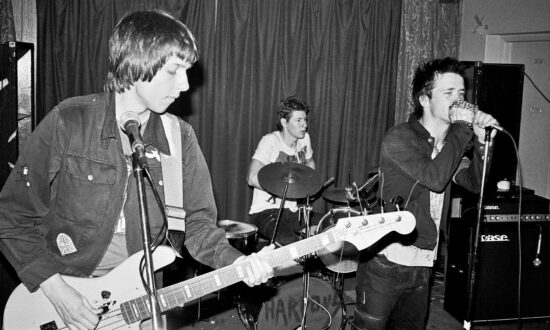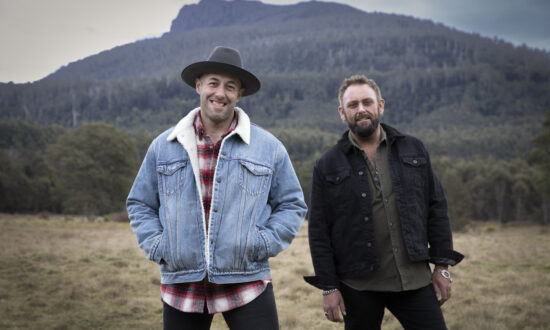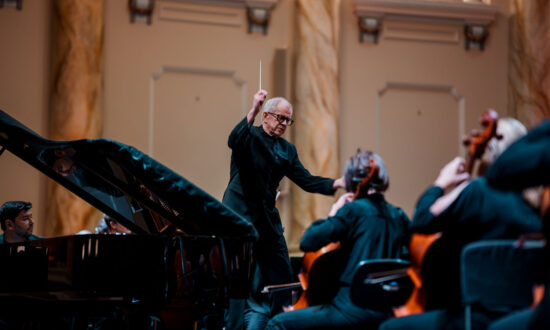After an extraordinary three days of singing from five of the country’s top choirs, we can say that Adelaide has just cemented its place as the choral capital of Australia.
Watch out for another Adelaide Chamber Choir Festival, because this first one was a tremendous success and deserves to be repeated. Let’s hope so.
The idea of convening a national choral meet here had its origins seven years ago, when Adelaide Chamber Singers and Melbourne’s Polyphonic Voices joined forces happily and successfully in Faure’s Requiem.
But this event was a first on an altogether larger scale. For this chamber choir festival, Adelaide also hosted the Sydney Chamber Choir, Brisbane Chamber Choir, and Voyces from Perth – rounding out all the leading chamber choirs from mainland Australia.
And very sportingly, they participated together in the finale concert in St Peter’s Cathedral so that one could compare them directly side by side.
Without getting too carried away with football analogies, it was highly interesting to see who might come out on top of the national league table.
One could certainly hear how each choir has its own character in terms of sound and style, though separating them on skill level was a more difficult call.
Kicking off proceedings, ACS possessed all the gentle refinement that has marked this choir from its many years with Carl Crossin to its new chapter under conductor Christie Anderson. They truly make an art out of polished restraint, especially when beginning with something as pithily beautiful as Anne Cawrse’s On Earth as in Heaven and There Will be Rest.
The home team’s performance of Luke Byrne’s Rainforest after this was a treasure too, their singing really warming up in the close vocal interplay and natural sound effects of chirping frogs in his pictorially evocative new piece.
From one of the smaller choirs to the largest, the 30-strong Sydney Chamber Choir presented a solid vocal tone of a more traditional character. They sang the ‘Kyrie’ and ‘Gloria” from Latvian composer Uģis Prauliņš’s Missa Rigensis with fine urgency, good discipline and king-sized dynamic contrasts that fully lit up the cathedral’s acoustic. This choir’s conductor, Sam Allchurch, marshals his singers most convincingly.
Looking smartly dressed with dark emerald green-themed evening wear, Brisbane Chamber Choir won the prize for visual presentation. But this medium-sized group of 23 singers, led by the accomplished Graeme Morton, also produces a very likeable sound that approaches that of ACS in flowing line. But they are also being capable of large dynamic swings, which hit home in the dramatic cries of Jonathan Rathbone’s Absolon, my son.
Moving to the intimate sounds of Carl Crossin’s new piece, With His Whole Heart, the Brisbane choir gave this a pleasantly airy, lightly pulsing performance that reminded one very much of ACS. It sounded totally appropriate. They further showed their stylistic versatility in an enlivening performance of the late Nigel Butterley’s rhythmically charged Exultate Deo.
It was then to a choir that aligns particularly closely with ACS in size and sound – Michael Fulcher’s Polyphonic Voices from Victoria. A youngish crew, they sing with particularly impressive verve and polish. Joe Twist’s The Peace of Wild Things was a special piece to savour in their bracket, as was to be expected from this fine Australian choral composer. It has heart and sincerity. Recorded birdcalls midway also make it a bit different.
The Melbourne choir’s lovely tone and precision made them a definite favourite. Richly glowing solo contributions from one of the tenors in Rebecca Clarke’s He that dwelleth in the secret places, and a short piece from the female Renaissance composer Raffaella Aleotti, her motet Vidi speciose, added to their interest.
Finally to Perth and its newish choir Voyces, founded in 2011. Under Robert Braham, this is a most impressive medium-sized outfit of, again, fairly young singers. They excelled across the board in some real hits of the modern choral repertoire, namely Samuel Barber’s Mary Hynes, Morten Lauridsen’s very lovely Se per havervi, oime, and Ēriks Ešenvalds’ Only in Sleep. The sweetest solo singing in this concert from one of their sopranos was a highlight in the latter.
In all their performances, Voyces’ warmth and precision were thoroughly enjoyable. Benjamin Britten’s amusing The Ballad of Green Broom rounded off their winning bracket.
There we had it, the team from Perth taking out this inaugural choral shoot-out.
However, proving that friendly unity is bigger than rivalry, all five choirs joined together in a wonderful surround-sound experience at the end thanks to another new piece composed by Crossin. Set to text by Sara Teasdale, whose words we heard at the very start in Anne Cawrse’s work, There Will Come Soft Rain, was another example of nature painting that dreamily takes us to places of escape and peace.

Get InReview in your inbox – free each Saturday. Local arts and culture – covered.
Thanks for signing up to the InReview newsletter.
Coordinating all 112 singers in this massive but poetic piece was itself no small feat. Standing centrally in mid-aisle, Crossin queued in all five choirs who lined each side of the cathedral and followed specific direction from their respective conductors.
The sense of ritualistic ceremony and gravitas had everyone transfixed, and their standing ovation said it all. This festival showed a path towards unity and togetherness perhaps like no other.
The finale of the Adelaide Chamber Choir Festival was performed at St Peter’s Cathedral on October 8.
Support local arts journalism
Your support will help us continue the important work of InReview in publishing free professional journalism that celebrates, interrogates and amplifies arts and culture in South Australia.
Donate Here




